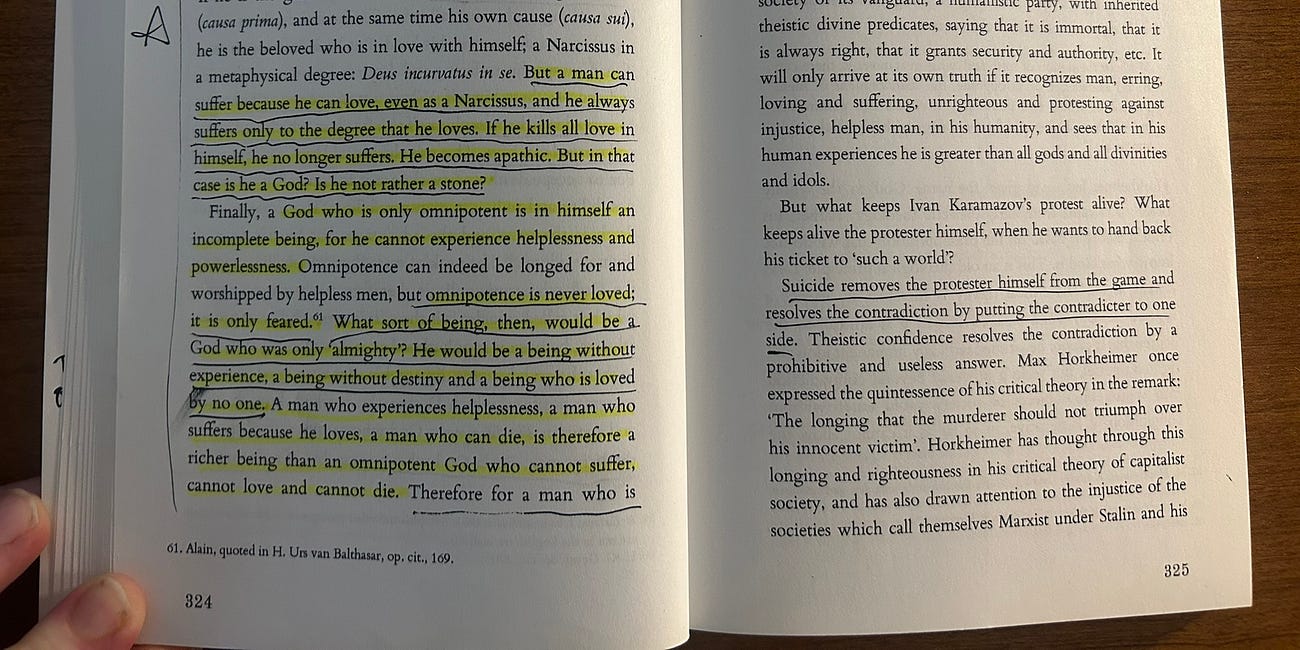Commonplace Book: "What about wealth?"
Commonplace book (n.): an edited collection of striking passages noted in a single place for future reference.
Excerpts from chapter 14 of Jesus Changes Everything, by Stanley Hauerwas: “What About Wealth?”1
“To be rich and a disciple of Jesus is to have a problem.”
“Jesus is very clear. Wealth is a problem. ‘You cannot serve both God and mammon’ (Matthew 6:24). That capitalism is a system justified by the production of wealth is therefore not necessarily good news for Christians.”
“To be formed in the virtues and by the prayer for our daily bread means that followers of Christ cannot help but appear as a threat to those invested in a system that aims to generate wealth and personal profit. Jesus’ disciples do not seek to be subversives; it just turns out that taking Jesus seriously cannot help but challenge the way things are, not to mention how we use our credit cards.”
“The lure of wealth and the cares of this world produced by wealth quite simply darken and choke our imaginations.”
“Too often those who propose strategies to recover the relevance of the church do so hoping that people can be attracted to Christ without facing the demands of self-sacrifice. For a time, they may be joyful about being saved, but such joy cannot survive persecution, not can it survive ‘the deceitfulness of wealth.’ The shallow character of many strategies for renewal is revealed in the fact that Christians cannot imagine how following Christ might put them in tension with a middle-class way of life. They mistakenly assume that securing a ‘good life,’ if not a sign of God’s blessing, is at least a legitimate pursuit.”
“It may seem odd that wealth makes it impossible for the word to take root. Wealth, we assume, should create the power to do much good in the world. But wealth stills the imagination because are not forced, as the first disciples of Jesus were, to be an alternative to the world that only necessity can create. Possessed by our possessions, we desire to act in the world, often on behalf of the poor, without having to lose our possessions.
“Note well: it is our possessions that encourage us to lie, making impossible the trust necessary to be Jesus’ disciples. To be saved, to be part of the body of Christ, is to participate in a people who make truthful speech with one another not only possible but necessary.”
“Lying and riches seem to work hand in hand.”
“Christians have always thought the development of the virtues of temperance and justice to be crucial for not being possessed by our possessions. Temperance - that is, moderate attachment to the world’s goods - and the pursuit of justice - limiting our desires in order to pursue our neighbor’s good as well as increasing our desire to render them what is their due - are the ways we learn to be a people who are not guilty of theft. To be able to say ‘enough is enough’ and to see our neighbor’s need as a claim upon our possessions are great, though difficult, virtues. Such virtues are necessary is we are not to be possessed by the lust for gain that otherwise seizes our lives.”
burnout, digital gardens, and commonplace books
I’m dealing with a bit of creative burnout right now, something that any long time readers of mine know is a semi-regular occurrence for me. I want to be one of those people who can write something every day, but the reality is I work in bursts. I’ve been having a creative burst since mid-January - inspired largely by my anger over what is happening in …
I wrote here about my intentions to use this space more like a commonplace book or digital garden.




